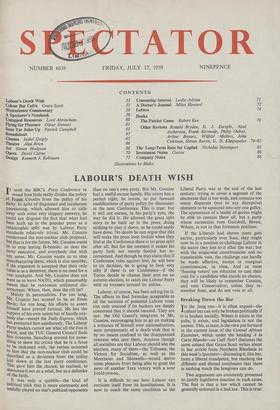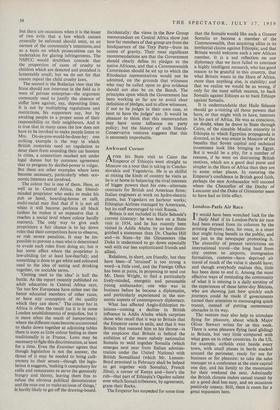Breaking Down the Bar
TN the long run—it is often argued—the -I-colour bar can only be broken politically if it is broken socially. Where it exists in the pubs, it exists, and legislation is not the answer. This, at least, is the view put forward in the current issue of the Central African Examiner, which under the heading A la Carte Blanche—ou Cafe Noir? discusses the same subject that Grace Scott writes about in her article from Northern Rhodesia in this week's Spectator—discussing it, like her, from a liberal standpoint, but reaching the different and dismal conclusion that there is nothing much the lawgivers can do.
Two arguments are commonly presented to justify legislative inaction in such cases. The first is that a law which cannot be generally enforced is a bad law. This is true: but there are occasions when it is the lesser of two evils that a law which cannot generally be enforced should exist, as an earnest of the community's intentions,and as a basis on which prosecutions can be undertaken for glaring infringements. The NSPCC would doubtless concede that the proportion of cases of cruelty to children which are detected and punished is lamentably small; but we do not for that reason repeal the child cruelty laws.
The second is the Butlerian view that the State should not intervene in the field as it were of private enterprise—the argument commonly used to justify the absence of stiffer laws against, say, depositing litter. It is not by multiplying regulations and restrictions, his supporters say, but by awaking people to a proper sense of their responsibility to their neighbours. And it is true that in many cases the law does not have to be invoked to make people listen to Mrs. Do-as-you-would-be-done-by; one striking example is the way in which British motorists need no regulation to deter them from sounding their car hooters in cities, a consortium reached not under legal duress but by common agreement that to progress by decibel-power is vulgar. But there are other examples where laws become necessary, particularly when eco- nomic interests are involved.
The colour bar is one of them. Here, as well as in Central Africa, the liberal- minded proprietor who seeks to make his pub or hotel, boarding-house or café, multi-racial may find that if it is not all white it will become perforce all black (unless he makes it so expensive that it reaches a social level where colour hardly matters). The only way to give such proprietors a fair chance is to lay down rules that their competitors have to observe, or risk severe penalties. It may be im- possible to prevent a man who is determined to evade such rules from doing so; but it has some effect where the proprietor is law-abiding (or at least law-fearful); and something is done to get white and coloured used to the idea of eating and drinking together, on sociable terms.
'Getting used to the idea' is half the battle. As the report recently published on adult education in Central Africa says, 'far too few Europeans have either met the better educated members of other races, or have any conception of the quality which they can show.' The colour bar in Africa is often the result (as it is in some London establishments) of prejudice, but it is more often the result of inexperience; where the different races become accustomed to shake down together at adjoining tables there is soon as little colour feeling as there traditionally is in France. Laws may be necessary to fight this discrimination, at least for a time. Even the Examiner agrees that though legislation is not the answer, the threat of it may be needed to bring café- owners to their senses—though the legis- lation it suggests, 'making it compulsory for cafés and restaurants to serve the genuinely hungry and thirsty, leaving them free to refuse the obvious political demonstrator and the man out to make an issue of things,' is hardly likely to get off the drawing-board.
Incidentally: the views in the Bow Group memorandum on Central Africa show just how far members of that group are from the hindquarters of the Tory Party—from its centre of gravity. Their most significant recommendations are that the Government should clearly define its pledges to the native Africans, and that a Commonwealth Commission should be set up to which the Rhodesian representatives would not be admitted, on the grounds that witnesses who may be called upon to give evidence should not also be on the Bench. The principles upon which the Government has been working so far are to avoid clear definition of pledges, and to allow witnesses, if not to be judges in their own case, at least to have the judges' ear. It would be pleasant to think that this memorandum may have some influence on party policy; but the history of such liberal- Conservative ventures suggests that this is extremely improbable.







































